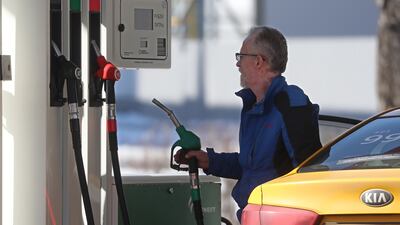Live updates: follow the latest news on Russia-Ukraine
Austria on Monday joined Germany in saying it could live with an embargo on Russian oil which it had previously opposed, moving the European Union a step closer to such a move.
The Alpine country's Climate Minister Leonore Gewessler said Austria was "ready to pull its weight" if the European Commission proposes a Russian oil ban and it is approved by the EU's 27 members.
Like Germany, Austria has reduced its reliance on Russian oil and went through March without processing any of it at all, Ms Gewessler said before a meeting of the bloc's energy ministers.
It came as the EU stepped up preparations for potential fuel shortages as the ministers met in Brussels in the shadow of Russia’s threats to cut off supplies.
The emergency summit was called after Poland and Bulgaria had their Russian gas imports stopped for refusing to pay in roubles, a demand made by the Kremlin after sanctions linked to the invasion of Ukraine were imposed.
Russia had previously supplied about 40 per cent of the EU’s gas and many countries are highly reliant on those imports, leaving them vulnerable if more nations are blacklisted by Russian supplier Gazprom.
A note circulated by the French presidency invited member countries to explain how they were preparing for a potential supply crisis and what action they would like their EU neighbours to take in response.
The bloc was hoping to agree to a common line on gas amid confusion over how countries could deposit euros or dollars with Russia’s Gazprombank without breaching EU sanctions. Moscow's demand for roubles is seen as a ploy to defend its currency from those sanctions.
As countries scramble for alternative suppliers, Poland said it had started receiving gas through a new pipeline from Lithuania and that transmission via that route would increase by the end of the week.
Ministers were also expected to address gas storage for the coming winter after the European Commission proposed setting a minimum level below which stocks should not be allowed to fall.
Oil debate
The softening of Austria's position on oil cleared another potential obstacle out of the way on that front, after Germany said it was now advocating an oil embargo by late summer.
Germany had previously held out against such a move for fear of causing economic chaos at home and punishing its own consumers rather than Russia.
But Europe's largest economy now says it has sufficiently reduced its dependence on Russian oil, from about 35 per cent to 12 per cent, that it could withstand an embargo that might have to be in place for years.
Most of the remaining portion comes from an oil refinery in eastern Germany whose supplies are harder to replace because it is owned by Russian company Rosneft, but this has not stopped Berlin from changing tack on an embargo.
“A few weeks ago, we knew we couldn’t have sustained it even for a month,” said Foreign Minister Annalena Baerbock. Sanctions should remain in place until Russian troops had left Ukraine’s internationally recognised territory, she said.
“It’s very important with every sanction that we bring into force that we can sustain it for years if necessary,” she said.
But Hungary, a leading sceptic of energy sanctions, signalled on Monday that it was not yet willing to support an oil embargo, which would need to be approved by all 27 members.
“Hungary’s stance on oil and gas sanctions on Russia remains unchanged: we do not support them,” Zoltan Kovacs, a spokesman for recently re-elected Prime Minister Viktor Orban, said on Monday.
Hungary did not stand in the way of a coal embargo passed last month and had previously hinted it would allow an oil ban to pass if there were sufficient alternatives.
The Czech Republic, which will take over the EU presidency from France in July, supports the idea of jointly purchasing gas from other suppliers such as Norway.






































